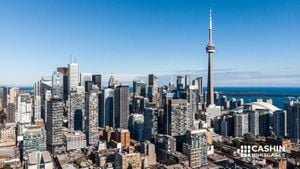Ghana recently witnessed a significant political shift as former President John Dramani Mahama, representing the National Democratic Congress (NDC), decisively won the 2024 presidential election. This victory marks Mahama's return to power after he lost the presidency to Nana Akufo-Addo of the New Patriotic Party (NPP) back in 2016. Mahama secured approximately 56.6% of the votes against Vice President Mahamudu Bawumia, who garnered 41.6%, with voter turnout reported at 60.9%. This election is noteworthy not only for its results but also for the broader political and economic contexts surrounding it, which may have significant ramifications for both Ghana and neighboring African nations.
The elections, held mostly peacefully, saw Mahama's party also score substantial victories in the parliamentary elections, potentially securing a two-thirds majority. This shift has imbued the opposition across Africa with new hope, revitalizing their aspirations for governance. Mahama's running mate, Jane Naana Opoku-Agyemang, will also make history as the first female vice president of Ghana, symbolizing progressive changes within Ghana's political environment.
Mahama’s campaign strategy focused heavily on addressing the economy, which has been struggling under high inflation and significant debt. Comments from various observers recognized this defeat of the incumbent party as reflective of Ghanaians’ dissatisfaction with the Akufo-Addo regime, particularly due to the rising cost of living and perceived governmental corruption. The former president's promises to bolster the economy and create opportunities for the youth might have swayed the younger electorate, which constitutes approximately 55% of Ghana's registered voters.
Indeed, amid economic hardship, Ghanaians felt the urgent need for change. Mahama has publicly acknowledged this economic crisis, emphasizing the necessity for hard work to restore the country's economic stability. He explicitly confirmed, "We all know the country is facing severe economic challenges, and it's going to take us significant effort to bring it back." His pledge to seek support from the clergy has also been interpreted as recognition of the high expectations Ghanaians have for his administration.
Looking beyond domestic policies, the potential of Mahama's victory to influence regional politics is significant, especially as it follows several successful transitions of power within other African nations. For example, democratically encouraged changes were seen this year with new leaderships adopted in countries like Botswana and Mauritius. The political dynamics might inspire opposition groups bolstered by Mahama's electoral achievement.
The International Monetary Fund (IMF) has indicated it remains open to renegotiation of Ghana's $3 billion deal with Mahama's administration, following the country's need for structural economic reforms. The IMF spokesperson clarified, "Any changes must maintain the economic objectives of the reform programmes." This development signals potential for adapting economic relief strategies, catering to Mahama's focus on reducing corporate taxes and smoothing repayments of restructured loans.
Nonetheless, the road to recovery isn’t anticipated to be smooth. Under Mahama's predecessor, Ghana's economy deteriorated, bottoming out with inflation rates reaching approximately 54% at one point. Inflation has since declined to 23% but still poses serious challenges for the incoming administration. The Ghanaian cedi has depreciated significantly over the past few years, contributing to economic instability.
It wouldn’t be unfair to compare this moment in Ghanaian politics with similar transitions across the continent, as many nations grapple with tired leadership and economic austerity. Political analysts suggest the necessity for opposition parties to realign their objectives to align more closely with the electorate's pressing needs. Many voters expressed their desires for economic recovery and accountability, which were key themes during the campaigns.
Another aspect of the 2024 election was the noteworthy civic engagement and electoral integrity demonstrated throughout the process. Unlike many other African countries, Ghana allowed for representation from different party members to monitor results at polling stations, enhancing transparency. This enabled confidence among the electorate and may have contributed to the peaceful transition of power.
John Mahama's political framing during his campaign centered around progressive economic policies and creating jobs for Ghana's youthful populace. This emphasis, along with his commitment to addressing major issues like education, healthcare, and infrastructure, resonates deeply with voters. By pledging to “reset” Ghana and restore its place as the ‘Black Star of Africa’, Mahama's narrative may have successfully captured the electorate's imagination.
While the electoral results could be seen as rejuvenation for the opposition, they also present challenges moving forward. Analysts predict Mahama’s incoming government must proceed cautiously, balancing promises to the electorate with achievable economic reforms. There are already murmurs about the hurdles the new administration may face, including restoring public trust and delivering on commitments made during the campaign.
The reactions from Mahama's opponents highlight the tension inherent within Ghana's two-party system. Bawumia conceded defeat gracefully, stating, "The people have voted for change," which can be seen as both acknowledgment of the opposition's ability to mobilize effectively and recognition of voters' desires for different leadership. His ability to stand down without conflict could be seen as strengthening Ghana's democratic image, which is often perceived as unstable throughout other parts of the continent.
Political commentators opine this electoral result might compel other African nations, struggling with similar socio-political dynamics, to re-evaluate their leaders and governance strategies. The broader pattern of electoral outcomes shows a growing appetite for democratic transitions and accountability from government officials.
The historical significance of this election transcends its immediate results; it embodies both local aspirations and the shifting tides across the continent. With Mahama poised to be inaugurated once again on January 7, 2025, he carries with him the weight of expectations from millions hoping for transformation. It remains to be seen whether Ghana's economy can rebound under his leadership, and if his administration can fulfill the promises made during the campaign—a task both pivotal and challenging.



